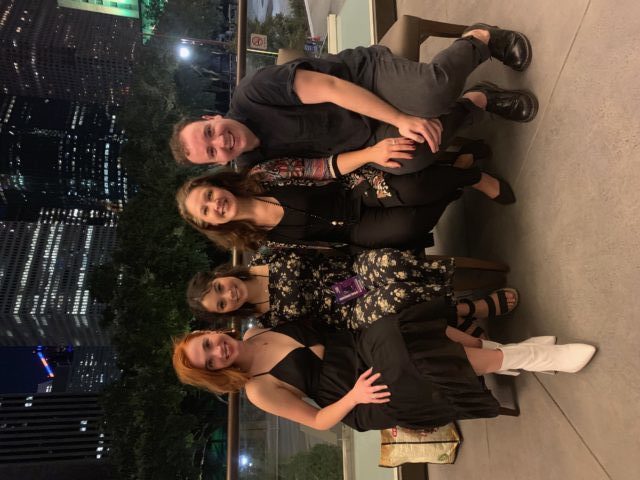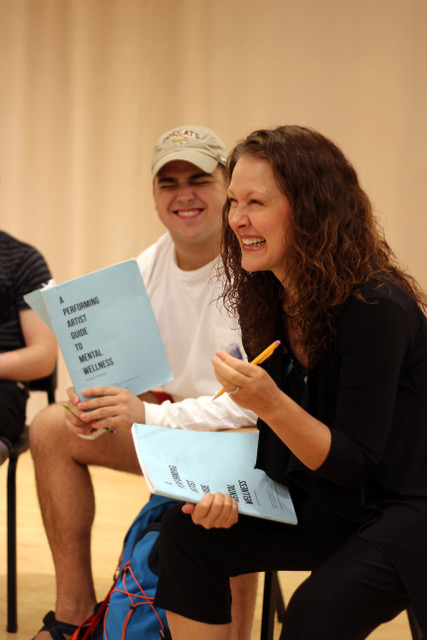5 Questions with Texas State’s Kaitlin Hopkins
Written by: CK Anderson
February 21th, 2020
Kaitlin Hopkins is the current head of the BFA Musical Theatre program at Texas State University. We sat down with Kaitlin to talk to her about her life, career, and what she loves about teaching.

1.) Tell us about yourself and how you ended up at TXST.
I grew up in the show business; my whole family is in the arts. I spent 30 years working professionally primarily as an actress, and later as a producer and director. In the spring of 2009, I was approached by the Chair of the Department of Theatre and Dance at Texas State, Dr. John Fleming, to see if I would be interested in designing and running a new BFA in musical theater. It was entirely unexpected, but it was such an incredible opportunity, that I backed out of the Broadway show commitment I had made for the fall and my husband, Jim Price, and I moved to San Marcos (which is just south of Austin, and so beautiful by the way) and collaborated on creating and launching this program. It has been quite an adventure. We weren’t sure at the time if we would stay or if we were just going to get it up and running and go back to New York, but here we are 11 years later having the time of our lives.
2.) What makes TXST different from other musical theatre programs?

I would have to say the holistic approach to the training and the individual, customized tracks for artists. Our students can customize their opportunities here to focus on additional areas of interest such as choreography, music direction, composition, singer/songwriters, directing, and playwriting. We also have a wellness curriculum that includes vocal health, physical health and nutrition, mental wellness, and life skills. If you want to learn more about the mental wellness curriculum we developed here, you can visit LivingMentalWelness.com. In addition, I would say the Business of the Business Labs sets us apart in preparing our artists for the professional market from a business perspective in conjunction with their performance-based training. These cover all aspects of the business: from how to read and negotiate all the different contracts they will work under, to building their websites and social media presence, to how to do your taxes on tour, financial planning, budgeting, you name it, we cover it. Lastly, I would say that the fact that we have our own faculty, and do not have to farm any classes out to the Music or Dance school is significant. There is a total of 12 full-time faculty that serve the 50 current musical theater students. Allowing us to collaborate and fully integrate all of our classes, treating musical theater as its own art form, not just three different disciplines that you have to be equally skilled in. Also, we have so many performance opportunities and musicals and plays.
3.) What do you look for when auditioning people for the program?
In terms of the audition itself, we are looking for simple, connected acting choices. We are looking for storytelling, not just in monologues but also in the acting of songs and the interpretation of the dance combination. We are looking for artists who are willing to play and aren’t afraid to fail, who also have integrity in all aspects of their lives. We seek out individuals who want to define, shape, and move the art form forward — fearless, joyful creators.
4.) What do you love the most about teaching?

Everything. Being part of an artist’s development and helping them find and define their unique voice is so exciting to me. I love helping my students develop a way of working, so they have a delivery system for their talent that offers them sustainability and longevity. That includes all aspects and areas of their lives. Creating community is huge for me, and a safe place for young artists to play and discover and hone their craft, and learn what it means to be a professional. I care that I raise good humans, not just good artists. I think people may have different definitions of what teaching is or what it means to be a teacher. To me, in part, it means being of service and facilitating artists in their journey. It is something I love in a way I’m not sure I can put into words, but it gives me a deep sense of joy and a feeling of knowing I’m where I am supposed to be.
5. What’s one piece of advice that you would you give to your high school self?
Hmmm, good question. Probably something really practical like save at least 10-20% of your salary from the very beginning and invest in a Roth IRA for as many years as you can. I would also say be kind to yourself and others, and practice gratitude, it will change your life, and understand that you are not competing with your friends, just with yourself and becoming the best version of you. The comparison game will not serve you. Just do you.
Need some advice? We’ve got you covered.
- 10 Tips for Being a Positive Role Model in Your Theatre Community
- 5 Ways to Say “Thank You” to Your Cast and Crew
- 5 Character Development Techniques to Use in Rehearsals
- 5 Small Ways to Get Into (And Embrace) Your Character
- 5 Ways to Take Care of Yourself During Tech Week
- Devising Theatre: 7 Quick Tips for Your First Devising Project
- “I Can’t, I Have Rehearsal”: 5 Tips for Scheduling Your Life When You’re In Theatre
- How to Make Rehearsals A Warm and Welcoming Environment
- 10 Basic Rules of Stage Combat (That Keep Everyone Safe)
- 5 Advantages of Learning Stage Combat
- Theatre Artists on a Budget: How to Be Smart and Healthy While Pinching Pennies
- Productions on a Budget: Finding Props/Costumes/Set Dressings/Set Pieces Without Breaking the Bank
- 6 Steps to Memorizing Shakespeare
- 5 Helpful Tips for Attending Callbacks
- 10 Tricks to Staying Healthy All Season Long
- How to Balance Theatre and Coursework
- 10 Items Every Actor Should Carry in Their Rehearsal Bag
- 10 Items Every Dancer Should Keep in Their Rehearsal Bag
- Discover the Delightfully Nerdy World of Dramaturgy
